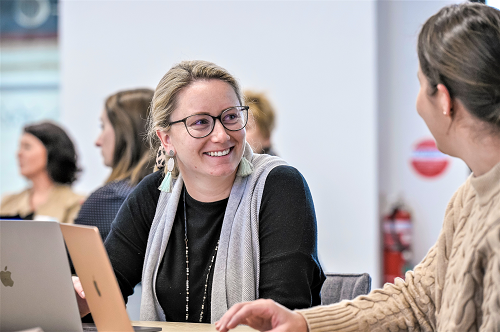
I undertook the Orbis Literacy R-3 program in 2019 and have been rewarded with new skills and knowledge, and a deeper understanding of how students learn. In addition I have gained valuable insight into resources and models that improve students’ literacy learning.
The opportunity to collaborate with other educators from across South Australia was of particular benefit to me personally and professionally. The Orbis program allowed us to build relationships, share resources, communicate planning, analyse data and share our expertise with one another. I strongly believe this collaborative approach not only contributes to school improvement and student success, but also improved our learning as educators.
I was very fortunate to have been able to collaborate and work closely with a colleague throughout the Orbis program. I would highly recommend that two or more participants from the school register together to enhance the learning, share ideas and concepts and then work together to implement the project in your classrooms.
My colleague and I discussed many ideas for our Orbis project. We used the learning design framework to identify what we wanted our students to learn, how we would determine they understood the intention and how we would achieve this objective. We ensured our applied learning project was related to our Site Improvement Plan, evidence based and complemented by the department’s guidebooks. Our learning project involved further supporting the students to understand sounds in words and transfer them to decode words for spelling, writing, reading and comprehension success. Once we had designed our learning project, we applied it in our classrooms.
My project explored the implementation of phonics practice with 6 reception students in a category 4, R-7 school that is situated on the southern side of the River Murray, in South Australia’s Riverland district.
Following an assessment of students using a range of assessment tools, I identified a target group of students not yet meeting the Standard of Education Achievement. Data revealed that these students were experiencing difficulty in understanding the alphabetic principle, that is, the predictable relationship between the individual sounds (the phonemes) of spoken language and the letters (graphemes) that represent those sounds in written language.
To support these students in developing their decoding skills and to become more confident decoders, an intervention was developed based on Michael Heggerty’s systematic scope and sequence of phonemic awareness lesson plans. The lessons were taught in conjunction with a teacher-developed, 10-week spelling program and involved the specific teaching of blends and addressed various decoding strategies. We targeted skills such as vowel manipulation, syllable awareness, sounding out, blending, chunking, letter patterns and morphology within reading.
Pre and post data sources consisted of Heggerty’s Phonemic Awareness Skills Screener Assessments, Running Records data, Phonics Screen Checks and written and oral phoneme reviews. Findings showed the students had an improved understanding of phonics and greater self-assurance in manipulating sounds. These are obviously important skills for young readers to become confident text decoders.
After reflecting on the huge success those trial students had made in their phonemic awareness skills, our school chose to implement Michael Heggerty’s Phonemic Awareness program in all 7 of our junior primary classrooms. Using the Heggerty program our teachers are able to collect their data and identify students’ strengths, as well as those areas needing improvement.
My time at Orbis has allowed me to implement literacy practices that build over time. I feel more confident in supporting students to develop a sound understanding of the English language for spelling, writing and reading and I encourage them to systematically build on these foundational skills, using writing and reading to learn in meaningful contexts.
I would highly recommend this program to anyone with a desire to further their ability to teach literacy.
Kind regards,
Kara Voigt